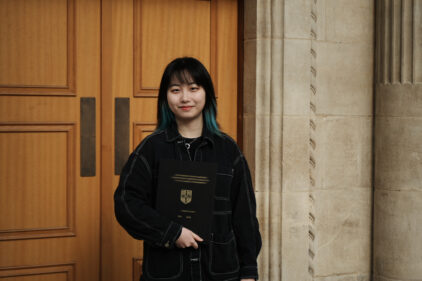
In the popular imagination, concrete is about as solid a substance as it gets. But, as anyone whose children have found themselves taught in portacabins as the UK attempts to repair its crumbling schools will tell you, its lifespan is limited, and its maintenance can be financially expensive and logistically complicated.
That’s why Zixuan Tang has just devoted her PhD to exploring the potential for self-healing infrastructure materials, as part of a team within the Engineering Department’s Geotechnical and Environmental Research Group.
“Materials like concrete are not as durable as we assume; they need ongoing maintenance, which has knock-on effects,” she explains. “For instance, closing a road causes inconvenience in people’s daily lives, while in offshore contexts it could be less practical or more expensive.”
There are also compelling environmental reasons to seek an alternative.
“Cement, a key component of concrete, is not environmentally sustainable, as its production leads to extremely high carbon emissions,” she points out. “Finding solutions for carbon reduction is something I’m passionate about.”
Zixuan has been working on the development of low-carbon self-healing fibre-reinforced composite materials as alternatives to traditional concrete, which have the capacity to repair themselves after being subjected to aggressive loading conditions. Prototypes have been successfully developed with analytical and modelling methods and tested in the lab. The next stage will be to be expose these to the outdoor environment to investigate how they respond to natural weathering.
“There are so many potential application areas for the new material. I’m really excited to see what might happen next,” Zixuan says.
Now employed as a software engineer in London, Zixuan is working on climate risk analytics platforms. Her current role expands on a longstanding interest in environmental sustainability and new technology.
“I enjoy doing research, and especially love learning and applying new technologies and creatively solving problems or building things. This guides my career choices,” she says.
Zixuan came to Cambridge for her PhD study after completing her undergraduate degree in engineering at China’s Hohai University, including a one-year exchange programme in the US, at UCLA. The Darwin College Boat Club quickly became a central part of her College experience.
“I had no physical or knowledge foundation for rowing – I’m not that tall or physically strong, but I dealt with it! I received lots of coaching and went from W4 to W1 after three years’ training, which I’m really proud of. I was also the kit officer, designing new kit and merchandise, working with the committee to get it approved, and with suppliers to get it manufactured and delivered in time for races and training, which was a fun job. I was very happy when our members loved the design.”
Combining this with a role as treasurer of the Darwin College Badminton Club, Zixuan has taken a proactive approach to her engagement with Darwin life.
“When I first stepped out of my home country, I was a bit unsure how to best approach to people who may look different from me, but I quickly realised that we’re all the same. Darwin and Cambridge have felt like a second home,” she concludes.
Zixuan will graduate this weekend with a PhD in Engineering.
